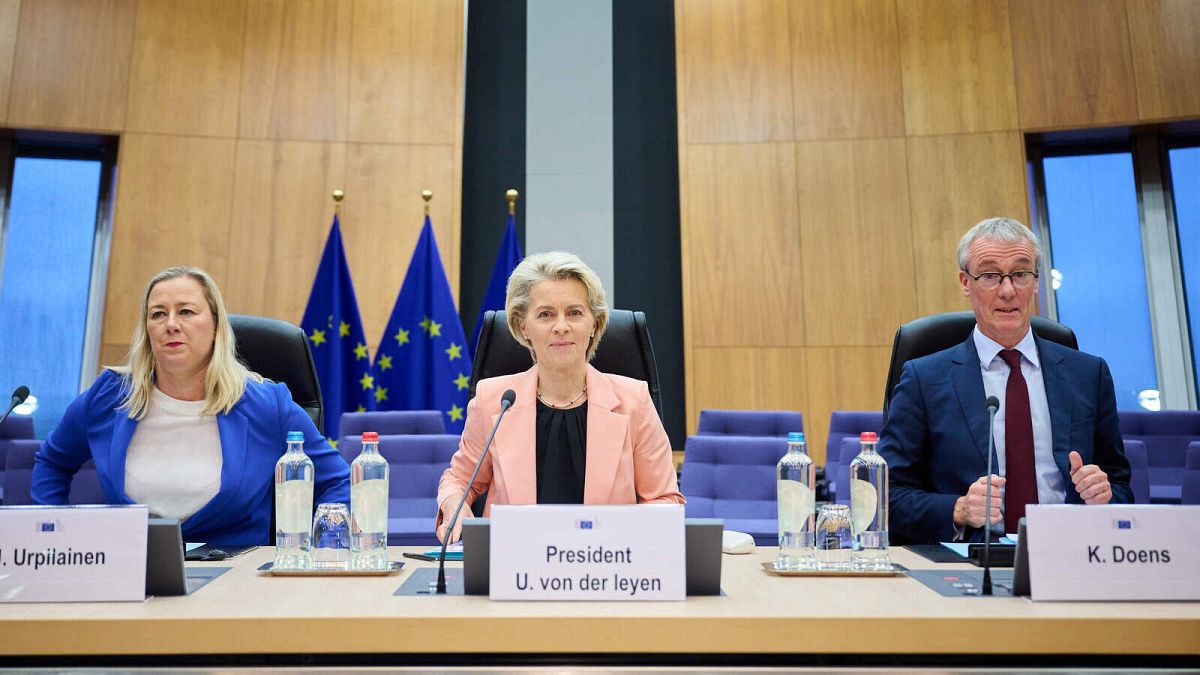The EU has announced a raft of new investment agreements as part of a two-day forum on Global Gateway, the bloc’s infrastructure partnership plan to rival China’s Belt and Road Initiative (BRI).
The new EU initiatives include agreements on critical raw materials with the Democratic Republic of Congo and Zambia and on green hydrogen with Namibia, as well as cooperation on clean energy with Bangladesh and Vietnam.
European Commission chief Ursula von der Leyen hosted over 40 leaders and ministers of EU partner countries in Brussels on Wednesday for the first in the two days of the summit, where she pitched the EU as a “better choice” for financing and building clean infrastructure.
“Global Gateway is about giving countries a choice, and a better choice,” von der Leyen said, adding that investment options often come at a “high price” for the environment, workers’ rights and sovereignty.
“No country should be faced with a situation in which the only option to finance its essential infrastructure is to sell its future,” she added.
Global Gateway earmarks up to €300 billion to support projects spanning critical raw minerals, green energy and transport corridors, in a bid to boost the EU’s trade and investments across the globe.
The bloc aims to offer an alternative to Beijing’s global ‘Belt and Road’ investment programme, vowing to channel quality investments without undermining countries’ sovereignty.
Last week, Chinese President Xi Jinping welcomed Russian President Vladimir Putin, Hungarian Prime Minister Viktor Orbán and Taliban representatives to celebrate his Belt and Road Initiative, which at $1 trillion (€900 billion) triples the budget of the EU’s plan.
Critics say Beijing is pursuing a policy of ‘debt-trap diplomacy’, making developing countries shoulder unsustainable debt levels and increasing their strategic reliance on China. Eighteen of the EU’s member states are also part of China’s initiative.
EU ministers absent
Countries including Armenia, Namibia, Mauritania and Senegal were represented in the Global Gateway forum by heads of state, while Albania, Bangladesh, Egypt, Georgia and Morocco were among the countries represented by their prime ministers.
But EU countries failed to match in diplomatic weight, with Germany sending its climate secretary and France its development secretary.
Tunisia was among the North African countries not represented in the forum, following a spat over a cooperation agreement that has seen Tunisia wire back €60 million in EU funds and prohibit the entry of EU officials into its territory.
In response to Tunisia’s no-show, a European Commission spokesperson said on Wednesday that “with Tunisia, in any case, we continue working under the MoU”, referring to the memorandum of understanding signed in July.
The Commission was also grilled on Wednesday on the inclusion of Energias de Portugal (EDP), a 20% Chinese-state owned energy company, on Global Gateway’s business advisory group. The EU executive is pursuing a plan to ‘de-risk’ its supply chains and investments to reduce strategic dependencies on China.
“There is no criteria preventing a company in which a minority stake may be owned by a non-European country from actually joining the business advisory group”, a spokesperson said.
The business advisory group includes 60 companies tasked with guiding the Commission on its strategic investments.
The Commission also rebuffed on Wednesday the notion that the plan was a response to China’s Belt and Road initiative.
“Global Gateway is the EU’s offer to develop intelligent, useful infrastructure and make other investments in our partner countries. That doesn’t mean that it’s directed against anybody else,” a spokesperson on behalf of the European Commission said.
While Global Gateway has been hailed as an ambitious plan to step up the EU’s global investments in clean technologies, a study on the programme presented this week before the European Parliament criticised the plan for lacking a “clear idea of how the GG functions and how they can participate in it.”

